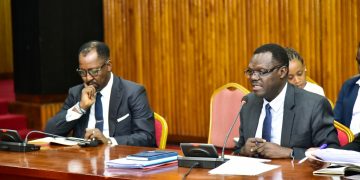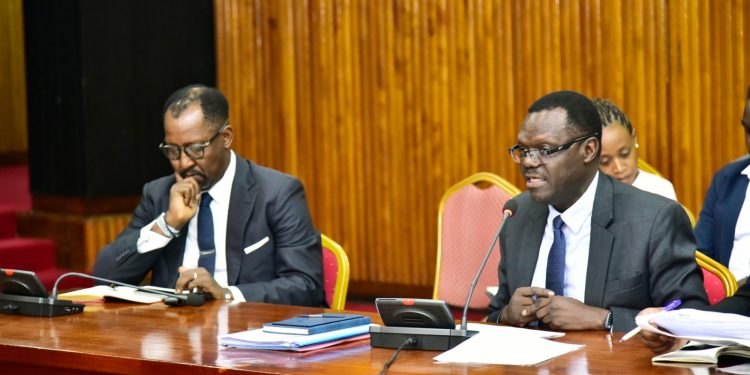Lawmakers have criticized the National Social Security Fund (NSSF) for giving Uganda Clays an unsecured loan of Shs11 billion.
This was during a meeting between NSSF management and the select committee investigating allegations of the fund’s mismanagement on Wednesday, 08 February 2023.
The Chairperson of the select committee, Hon. Mwine Mpaka questioned the management’s decision under the leadership of former Managing Director, Richard Byarugaba to disburse the loan to a company that was making loses between 2008 to 2010.
He was speaking in reference to the Auditor General’s management letter which indicated that the loan was disbursed in 2010, with a repayable period of 96 months. The report noted that up-to-date, no amount has been recovered.
“You [Byaraguba] were the chairman of the audit committee, the same year the unsecured loan was given to Uganda Clays. It has also come to our attention that this loan has been written off. You are writing off money which belongs to the savers, it is not from the consolidated fund,” said Mwine Mpaka.
This prompted Workers’ representative, Hon. Charles Bakkabulindi to seek clarification on the difference between the savers’ fund and commercial banks.“
Does the savers’ fund now operate like a commercial bank? You mean the fund now has reached an extent of behaving like commercial banks? Bakkabulindi asked.
Hon. Richard Gafabusa (NRM, Bwamba County) asked if a risk evaluation was performed before the loan was disbursed, to which the NSSF’s Head of Risk, said it was irregular to give an unsecured loan to Uganda Clays.
Byarugaba explained that the loan was provided to enable Uganda Clays to expand production.
“They sought to set up a new factory in Mbale, good idea but badly executed. The products that were coming out did not sell, the loses were high,” said Byarugaba.
To redeem the company, Byarugaba said that NSSF intervened and took over management so as to recover the loan.
“The fund was under obligation to take reasonable steps to recover the loan. Having seen that this company in which we have a big share was going down, we seconded two of our staff and the company has turned around and become profitable,” he said.
He added: “The company has re-instituted the loan on its books and the fund members are assured that their money is safe.”
The MPs also expressed disappointment with the NSSF’s management for causing the fund a loss of Shs2.6 billion in the procurement of smart cards and point of sale machines for savers.
In July 2022, NSSF in partnership with Centenary Bank launched a three-in-one smart card where savers were meant to access merchandise at discounted prices.
Hon. Mwine Mpaka however, highlighted the Auditor General’s report, indicating that since it was launched, the product has not been used.
He asked why the management proceeded to procure the pay point machines, even after establishing that the cards could not serve the purpose for which they were introduced.
“You fly to India to verify the cards and it comes when it is not working but you follow with purchase of sale of point machines. After two months you abandon it. How did you procure these cards and machines?” Mwine Mpaka asked.
Hon. Gafabusa wondered why NSSF did not take precautionary measures through ensuring that the contract with suppliers provided guarantee to the fund.
“If the card did not meet the fitness test, why wasn’t it returned and money claimed?” he asked.
NSSF’s Head of Procurement, Gerald Mugabi, and former MD Byarugaba admitted that the product was a bad choice.









